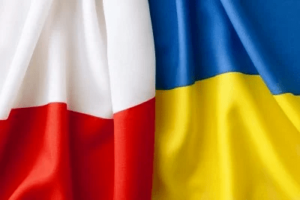Poland in the Information War against Russia: What Polish Online Media Are Saying About Ukraine
Since the beginning of the full-scale Russian invasion of Ukraine, Poland has been a constant ally of Ukraine, providing support and assistance at all levels. But what is the position of Poland in the information field regarding Ukraine and the war? The Centre for Strategic Communication and Information Security has studied the media landscape of Polish online media over June and July. It is reported by Upmp.news with reference to “Centre for Strategic Communication”.
Methodology: collecting and analysing publications in Polish online media containing references to Ukraine and/or the war in Ukraine with the help of machine learning.

Poland covers the issue of the war in Ukraine in its own information space quite actively, and since mid-July, there has even been an increase in the number of publications in the media. This is primarily due to the geographical proximity to the war events and Poland’s diplomatic vector of helping Ukraine. In addition, Russia is waging its information war against Poland, threatening to attack and trying to pit it against Ukraine, which also increases Poland’s attention to Ukraine and the war.



Economy is a popular subject of publications, while Ukraine’s European integration is covered less; yet it remains widespread in Polish online media.
The number of publications on sanctions is gradually decreasing, while the topics of culture, thanks to neutral materials, the topic of Ukraine’s accession to NATO and the of the food crisis receive more coverage. By the way, the topic of the food crisis has increased not only in the overall quantitative presentation, but also in terms of the share of positive tone of the news. This may be due to the possible grain deal and the statements of the Ukrainian authorities on the possible restoration of seaports’ work.
In July, there were the least publications on military aid to Ukraine; however, the share of positive publications on this subject has grown. In particular, this is connected with the story about a new package of US military aid to Ukraine.
War, conflict, aggression or “special military operation”?
Polish media mostly use words like “war,” “aggression,” or “conflict” to refer to Russia’s war against Ukraine.
“Special military operation” is a term coined by Russian propaganda to justify Russian crimes against Ukraine; it is also found in some publications in Polish media, but mostly either in direct quotes of Russian officials, or with the qualifier “so-called.”
In addition, some Polish media use the expression “Putin’s war” (as well as its variations such as “Putinist aggression“, “Putin’s invasion“) to refer to the war of the Russian Federation against Ukraine. However, these phrases are not very common.
Polish media hardly use the phrase “Ukrainian crisis” in relation to the Russian-Ukrainian war. Even if there are isolated cases, they have not become a general trend.
Ukraine and Russia: which one gets more coverage?

Among Ukrainian officials, the President of Ukraine Volodymyr Zelenskyy has the largest number of mentions in the Polish media. There are only occasional mentions of other representatives of his Office. In June and July, Prime Minister Denys Shmyhal and Deputy Head of the Office of the President Kyrylo Tymoshenko were mentioned. Among the heads of oblast state administrations, Polish media only mentioned Pavlo Kyrylenko, head of Donetsk oblast state administration, in June and July. However, when anyone other than Zelenskyy is mentioned in Polish online media, it is either due to major developments, or in the context of international events.
For instance, Denys Shmyhal is mentioned in the context of the presentation of the map with proposals on restoration of Ukraine’s damaged areas at the conference in Lugano; Kyrylo Tymoshenko — in the context of the Russian shelling of the shopping mall in Kremenchuk, and Andrii Melnyk and Dmytro Kuleba — in the context of the scandal around the interview of Ukraine’s ambassador to Germany with a German publication, particularly his statement about Stepan Bandera.
However, compared to representatives of Russia, the Ukrainian official position is presented less frequently in Polish online media. The number of mentions of Vladimir Putin alone is almost 4,500 more than that of Volodymyr Zelenskyy in the period from June 17 to July 10.

One of the main reasons why Russian representatives are more prominent in the Polish media space is their big threatening statements. For example, Dmitry Medvedev, who has a small number of mentions in general, appears in the Polish media in the context of his threat of a “third world war” against Lithuania due to the blocking of transit to the Kaliningrad region.
What do the Polish online media write about Ukraine and Russia’s full-scale invasion of Ukraine?
Polish online media focus more on the political and international issues of Russia’s war against Ukraine, as well as the role of Europe and the United States in helping Ukraine. In general, Poland expresses great support for Ukraine in the information environment as well. In particular, in Polish media reports, Ukraine is depicted as an integral part of the European world, and there are also calls for the provision of more weapons.
However, the analysis of key messages also shows Poland as another direct player in this war. This is explained by the fact that Russian propaganda is targeting Poland, threatening it with an attack and trying to use media manipulations to create a conflict between Poland and Ukraine.Therefore, Polish online media contain publications that recognize the hostility of the Russian Federation towards Poland, the inadmissibility of the “Russian world” reaching the territory of Poland, and about the protection of its own territory from the Russia.
Russia is often described in Polish publications as the “biggest threat” alongside such clarifications as “an act of hostility by Russia” or “Russian barbarism.” Russia is mostly mentioned in the context of its failures, poor predictions of its future in the war against Ukraine, and in the context of its war crimes.

